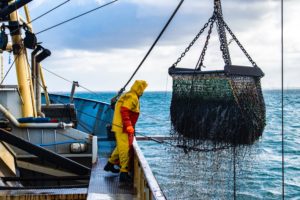The UK must futureproof fisheries with ‘climate-smart’ action
By adopting a ‘climate-smart’ fisheries strategy, UK governments could help to accelerate progress to net-zero, according to a report published by WWF, Marine Conservation Society, RSPB.
In the wake of the IPCC report and ahead of the COP26 climate summit, conservation organisations are calling on the UK government to:
- Reduce the carbon emissions that come directly from the UK fishing fleet
- Enhance marine biodiversity by reducing – and where possible reversing – the damage from unsustainable fishing practices
- Increase the potential for UK seas to act as a carbon sink by helping protect blue carbon habitats
According to the report, over 50% of the UK fishing fleet vessels are around 30 years old, and the vast majority are powered by fossil fuels. Based on UK fishing vessel activity data, UK fisheries are estimated to have emitted 914.4. kilotons of CO2 over a 1 year period, the same as providing the annual energy use of over 110,000 homes.
Fisheries can also damage the ocean’s capacity to act as a carbon sink, due to the use of bottom towed gear that destroys carbon-rich habitats like seagrass meadows and muddy sediments.
The first post-Brexit UK fish stock audit published at the start of 2021 showed that only three of the UK’s top ten fish populations are fished at or below maximum sustainable yield.

Despite these impacts, the report highlights that fisheries are often overlooked by governments in strategies to address the climate and nature crises.
The report concludes that, by adopting a ‘climate-smart’ fisheries strategy, UK governments could help to accelerate progress to net-zero and make the UK fishing industry leaders in the field.
The UK already has world-leading legislation in place to deliver this – in the form of the UK Fisheries Act, 2020 – which sets out a clear objective to address the climate impact of fisheries. A ‘climate-smart’ approach is a blueprint to deliver on that target.
Helen McLachlan, Fisheries Programme Lead at WWF, said: ‘The ocean is the blue heart of our planet and, when it comes to tackling the climate and nature crises, we ignore it at our peril.
‘As an independent coastal state, the UK has the chance to set a gold standard in fisheries management by delivering on the world-leading climate commitments set out in the UK Fisheries Act 2020 – ministers must make good on that promise.
‘Adopting a climate-smart strategy is the way to do this, futureproofing the sector while showcasing the UK’s commitment to slashing its global environmental footprint ahead of COP26. We won’t forget the UK governments’ climate promises and, together with our supporters, we will hold governments to account for delivering on them.’
Photo by Paul Einerhand















